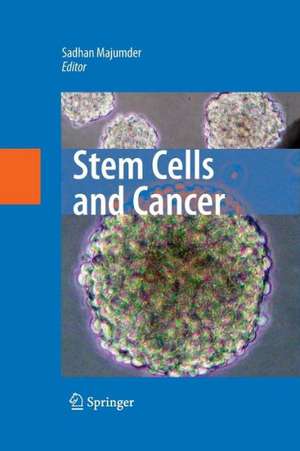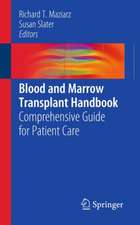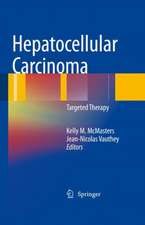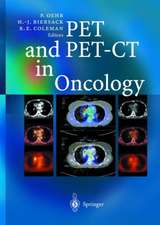Stem Cells and Cancer
Editat de Sadhan Majumderen Limba Engleză Paperback – 2 dec 2014
The objectives of this book, therefore, would be to impart up-to-date information about the role of stem cells in the development of normal and cancerous tissue, the mechanisms that differentiate normal from cancerous functions, and the use of these findings in developing mechanism-based therapies.
| Toate formatele și edițiile | Preț | Express |
|---|---|---|
| Paperback (1) | 1095.16 lei 6-8 săpt. | |
| Springer – 2 dec 2014 | 1095.16 lei 6-8 săpt. | |
| Hardback (1) | 1001.45 lei 38-45 zile | |
| Springer – 28 iun 2009 | 1001.45 lei 38-45 zile |
Preț: 1095.16 lei
Preț vechi: 1152.81 lei
-5% Nou
Puncte Express: 1643
Preț estimativ în valută:
209.57€ • 224.09$ • 174.73£
209.57€ • 224.09$ • 174.73£
Carte tipărită la comandă
Livrare economică 18 aprilie-02 mai
Preluare comenzi: 021 569.72.76
Specificații
ISBN-13: 9781489982872
ISBN-10: 1489982876
Pagini: 312
Ilustrații: XIV, 296 p.
Dimensiuni: 155 x 235 x 16 mm
Greutate: 0.44 kg
Ediția:2009
Editura: Springer
Colecția Springer
Locul publicării:New York, NY, United States
ISBN-10: 1489982876
Pagini: 312
Ilustrații: XIV, 296 p.
Dimensiuni: 155 x 235 x 16 mm
Greutate: 0.44 kg
Ediția:2009
Editura: Springer
Colecția Springer
Locul publicării:New York, NY, United States
Public țintă
ResearchDescriere
Cancer is a primary cause of human mortality worldwide. Despite decades of basic and clinical research, the outcome for most cancer patients is still dismal. Some stumbling blocks to developing effective therapy include the heterogeneity of cancer tissues, the lack of knowledge about the critical molecular mechanisms in cancer tissues (which are typically aberrant compared with mechanisms in normal tissue), and the lack of good mechanism-based therapeutic approaches. The recent findings that most cancers contain a small fraction of self-renewing, differentiation-blocked stem cell-like cells (cancer stem cells) and that it is these cells—and not the major bulk of the tissue—that are the root cause for cancer initiation and metastasis have also highlighted the need to change our approach to cancer therapy.
The objectives of this book, therefore, would be to impart up-to-date information about the role of stem cells in the development of normal and cancerous tissue, the mechanisms that differentiate normal from cancerous functions, and the use of these findings in developing mechanism-based therapies.
The objectives of this book, therefore, would be to impart up-to-date information about the role of stem cells in the development of normal and cancerous tissue, the mechanisms that differentiate normal from cancerous functions, and the use of these findings in developing mechanism-based therapies.
Cuprins
Stem Cells and Cancer: An Introduction.- Molecular Regulation of the State of Embryonic Stem Cells.- MicroRNAs in Stem Cells and Cancer Stem Cells.- Cancer Stem Cells and Metastasis: Emerging Themes and Therapeutic Implications.- Stem Cells in Leukemia and Other Hematological Malignancies.- Prostate Cancer Stem Cells.- Breast Cancer Stem Cells.- Stem Cells and Lung Cancer.- Cancer Stem Cells in Colorectal Cancer.- Cancer Stem Cells and Skin Cancer.- Lineage Relationships Connecting Germinal Regions to Brain Tumors.
Textul de pe ultima copertă
Cancer is a major cause of human morbidity and mortality worldwide. Despite decades of basic and clinical research, the outcome for many cancer patients is still dismal. Although the existence of "stem-like" cells in cancer was hypothesized more than 150 years ago, recent discoveries have the potential to revolutionize cancer therapy. In particular, we now know that many cancers contain a fraction of self-renewing, drug- and radiation-resistant cells (cancer stem cells or cancer-initiating cells) and it is these cells—and not the major bulk of the tissue—that are the root cause for cancer initiation, relapse and metastasis. In a single volume, Stem Cells and Cancer offers up-to-date information about the role of stem cells in the development of normal and cancerous tissue, the mechanisms that differentiate normal from cancerous functions, and the use of these findings in developing mechanism-based therapies across all major types of cancer. It provides timely, cutting-edge information about cancer stem cells from the perspectives of both the basic and clinical sciences.
Caracteristici
Will provide timely, cutting-edge information about cancer stem cells from the perspectives of both the basic and clinical sciences











